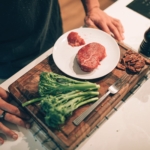The body is very highly connected and there is a link between the organs of the gut and the brain which is termed the ‘Gut-Brain Axis’. The link between the two works both ways, the gut and the things we digest can affect our brain function and similarly stresses to the nervous system can affect our gut. Research in this area originated in around 2004, and since has gained a lot of momentum in the scientific community (1), and can impact your health in numerous ways.
Basics of the Gut and Brain
From when you eat food to when you excrete it, food will travel down a system of pipes in the body. Starting with the mouth and jaw you chew food and this is the initial mechanical breakdown before continuing its journey. Next, there is a further breakdown of the food into tiny molecules, this is chemical digestion with the help of enzymes to break the food down. After this we have absorption and excretion, the nutrients are absorbed and used by the body before the rest is excreted.
The nutrients absorbed and the bacteria that exists in the gut can both affect the brain, this is because what we eat affects our hormones, neurotransmitters and immune system. The brain and nervous system will run on what you deliver to it, so setting up the right environment for the brain includes getting your gut and nutrition set up well.
How to Help Your Gut
1. Real Food
As mentioned in our article on nutrition, real food includes eating things which have lived, flown, swam, moved, or been grown. Our gut and brain will respond to what we eat, and real food is the best bet for optimising the health of these organs.
2. Stomach Acid
Stomach acid is what we have in the stomach to help with digestion, stomach acid is mainly comprised of Hydrochloric Acid (HCl). If we are lacking in this area, it could be causing decreased nutrient absorption, bacterial overgrowth and increase the likelihood of infections. Supplementing with HCl and Pepsin can be a way of increasing stomach acid and this could improve how you digest food, resulting in less gas, bloating, acid reflux or stomach pain.
3. The FODMAP and GAPS Approaches
FODMAPs are types of carbohydrates, and there are correlations between eating foods high or low in FODMAPs with digestive issues such as gas, bloating, or stomach pain.
High FODMAP foods include Apples, Blackberries, Cherries, Milk, Whey, Cheeses, Artichokes, Asparagus, Broccoli, Beans, Lentils, Bread, Pasta and various others which can be found on link (2).
Alternatively, the GAPS diet might be of benefit, this stands for Gut and Psychology Syndrome, highlighting the link between what we eat and our brain function, and also on how our nutrition affects our gut health. Essentially, this approach is designed to heal the gut and help detoxify, with detailed information available here (3).
Easy Tips for Your Gut
To kickstart an improvement in your gut health, apply the following tips which are simple and easy to add into your daily life:
Tip 1: Lime, salt and ginger in the morning:
Start your day by drinking a glass of filtered water with the juice of a whole lime squeezed, a pinch of pink Himalayan salt and a few drops of juice from ginger. Give it 15-30 mins then have your breakfast consisting of healthy proteins, fats and greens.
Tip 2: Fermented foods:
Adding in small amounts of fermented foods such as Sauerkraut can add healthy bacteria to your gut, which is important for the gut lining and removing digestive issues.
Tip 3: Food rotation:
Try not to eat the same food every day, so, for example, rotating your protein one day from beef to venison, or your greens from spinach to kale. This helps keep your gut diversified with bacteria.
How do I Assess My Gut Health?
Simply being aware of the potential symptoms, which could be gas, flatulence, bloating, constipation, stomach aches and acid reflux. As your gut health improves so will these symptoms, they will occur less often or decrease in their severity, for example, you might notice that you are not bloated after a meal consisting of particular ingredients which shows you are breaking those down better and rotating food frequently.
Should you need further advice on specific issues related to your gut health, then investing in a consultation can provide you with tailored advice that extends beyond this article, including specific nutritional recommendations and supplementation.
If you would like to book a Consultation with Roan, or explore the possibility of starting our online training programme, please head to our Consultations page for more info on how to do this.
Disclaimer
Always speak with your physician or other healthcare professionals before making any nutritional & lifestyle changes or before taking any nutritional supplement. For more information, please view our terms & conditions.
References
Further Reading


